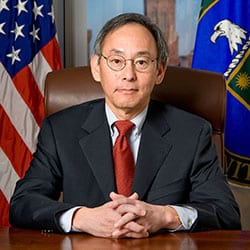Steven Chu – challenges and opportunities of climate change
By Oli Usher, on 1 April 2014
I’m sure Malcom Gladwell has something to say about Steven Chu. He is improbably successful in two totally different fields, and part of me wonders how he ever found the time to do it.
No sleep, perhaps?
Part-way through a stellar academic career in physics (including a Nobel Prize before he hit 50), Chu took a leave of absence.
In his four-year sabbatical, instead of sailing around the world or learning the violin like normal people might, he went to work for Barack Obama, serving as his Secretary of Energy until 2013, before heading back to a post at Stanford University when he was done.
In London to examine a physics PhD – Chu’s expertise is in laser cooling – he dropped by to offer a public lecture (Harrie Massey Lecture Theatre, 19 March) to a packed auditorium at UCL.
The topic: the challenges and opportunities of climate change – a subject he grappled with in his time in public office.
 Close
Close





